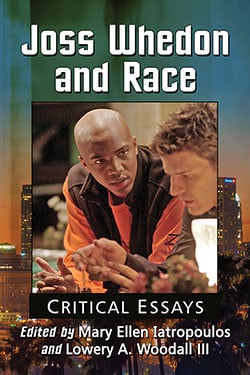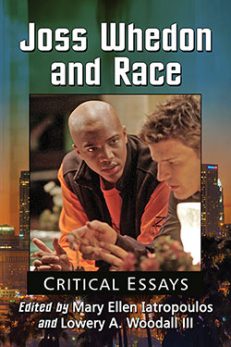Joss Whedon and Race
Critical Essays
$39.95
In stock
About the Book
Joss Whedon is known for exploring philosophical questions through socially progressive narratives in his films, television shows and comics. His work critiques racial stereotypes, sometimes repudiating them, sometimes reinvesting in them (sometimes both at once). This collection of new essays explores his representations of racial power dynamics between individuals and institutions and how the Whedonverse constructs race, ethnicity and nationality relationships.
About the Author(s)
Bibliographic Details
Edited by Mary Ellen Iatropoulos and Lowery A. Woodall III
Format: softcover (6 x 9)
Pages: 340
Bibliographic Info: bibliography, index
Copyright Date: 2017
pISBN: 978-0-7864-7010-5
eISBN: 978-1-4766-2657-4
Imprint: McFarland
Table of Contents
Preface and Acknowledgments 1
Introduction. The Individual, the Institutional and the Unintentional: Exploring the Whedonverses Through Critical Race Theory 10
Mary Ellen Iatropoulos and Lowery A. Woodall III
Part I. The Caucasian Persuasion Here in the ’Dale: Race and Ethnicity in Buffy the Vampire Slayer
“The black chick always gets it first”: Black Slayers in Sunnydale 37
(Lynne Edwards)
“I have no speech, no name”: The Denial of Female Agency Through Speech in Buffy the Vampire Slayer 51
(Rachel McMurray)
A Dodgy English Accent: The Rituals of a Contested Space of Englishness in “Helpless” 72
(Joel Hawkes)
She’s White and They Are History: Buffy the Vampire Slayer’s Racialization of the Past and Present 91
(Nelly Strehlau)
“Let it simmer”: Tonal Shifts in “Pangs” 108
(Rhonda V. Wilcox)
Part II. From Buffy to Angel: Racial Representation Across Sunnydale and L.A.
Representations of the Roma in Buffy and Angel 127
(Katia McClain)
An Inevitable Tragedy: The Troubled Life of Charles Gunn as an Allegory for General Strain Theory 150
(Rejena Saulsberry)
Part III. Firefly/Serenity and Dollhouse: Race and Ethnicity at the Margins of the ’Verses
Race, Space and the (De)Construction of Neocolonial Difference in Firefly/Serenity 169
(Brent M. Smith-Casanueva)
Mexicans in Space? Joss Whedon’s Firefly, Reavers and the Man They Call Jayne 184
(Daoine S. Bachran)
Zoe Washburne: Navigating the ’Verse as a Military Woman of Color 200
(Mayan Jarnagin)
Programming Slavery: Race, Technology and the Quest for Freedom in Dollhouse 215
(Brandeise Monk-Payton)
“Memory itself guarantees nothing”: Dollhouse, Witnessing and “the jews” 233
(Samira Nadkarni)
Part IV. It’s a Play on Perspective: Long Views and Deep Focus on Race in the Whedonverses
On Soldiers and Sages: Problematizing the Roles of Black Men in the Whedonverses 253
(Candra K. Gill)
The Godmothers of Them All: Female-Centered Blaxploitation Films and the Heroines of Joss Whedon 268
(Masani McGee)
Someone’s Asian in Dr. Horrible: Humor, Reflexivity and the Absolution of Whiteness 283
(Hélène Frohard-Dourlent)
About the Contributors 299
Combined Bibliography 303
Index 319





